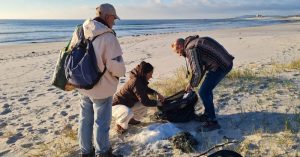
Desde el día 13 de diciembre, las playas del litoral de Galicia se encuentran cubiertas de millones de microplásticos. Esta marea blanca de pélets, provienen de un barco de mercancías que llegaba a las costas gallegas y se ha extendido, ahora, hacia otras comunidades.
La Xunta de Galicia ha declarado el nivel 2 de alerta, a día 9 de enero de 2024. Esta acción ya se ha llevado a cabo en Asturias debido a la aparición generalizada de microplásticos en los arenales de toda la costa asturiana. A su vez, el País Vasco ha activado el Plan de Emergencia Marina hoy, 10 de enero, y tratará de recoger todos los péletes en alta mar. Santander y Cantabria afirman que ya se ha encontrado restos de estos plásticos en sus arenales.
Los pélets son microplásticos de un tamaño inferior a 5 mm que son utilizados a la hora de fabricar productos de plástico como botellas, contenedores o bolsas. Según los datos emitidos por Plastics Europe, actualmente, más de 50.000 empresas fabricantes y productoras, los utilizan.
Los plásticos vertidos en el litoral gallego formaban parte de la mercancía del buque Toconao y se han llegado a perder hasta seis contenedores en costas portuguesas. Su tamaño y peso dificultan la retirada de estos elementos y las personas que se encargan de esta labor, deben tener cuidado para no esquilmar la arena de la playa mientras los plásticos son retirados. Hasta ahora, una asociación ecologista gallega, Noia Limpa, ha contabilizado alrededor de 70 sacos de 25 kilos cada uno en las playas de Galicia en las que han trabajado.
Miles de voluntarios se han organizado a través de redes sociales y organizaciones ecologistas para retirar estos residuos. A ellos, se les suman los 200 efectivos de limpieza desplegados por la Xunta de Galicia para colaborar en las distintas playas afectadas.
Algunas asociaciones llevan denunciando desde hace décadas el impacto de los microplásticos en las costas y océanos, pidiendo a las administraciones que asuman las responsabilidades y advirtiendo del impacto medioambiental de esa crisis por la incorporación de los plásticos en la cadena trófica de los animales marinos, implicando un gran riesgo para los ciudadanos.
__
Since December 13, the beaches of the coast of Galicia are covered with millions of microplastics. This white tide of pellets comes from a cargo ship that reached the Galician coast and has now spread to other communities.
The Xunta de Galicia has declared a level 2 alert on January 9, 2024. This action has already been taken in Asturias due to the widespread appearance of microplastics in the sandy beaches along the Asturian coast. In turn, the Basque Country has activated the Marine Emergency Plan today, January 10, and will try to collect all the pellets in the open sea. Santander and Cantabria claim that traces of these plastics have already been found in their beaches.
The pellets are microplastics of a size of less than 5 mm that are used in the manufacture of plastic products such as bottles, containers or bags. According to data issued by Plastics Europe, they are currently used by more than 50,000 manufacturing and production companies.
The plastics dumped on the Galician coast were part of the merchandise of the ship Toconao and up to six containers have been lost on Portuguese coasts. Their size and weight make it difficult to remove these elements and the people in charge of this task must be careful not to deplete the sand on the beach while the plastics are being removed. So far, a Galician environmental association, Noia Limpa, has counted around 70 sacks of 25 kilos each on the beaches of Galicia where they have worked.
Thousands of volunteers have organized through social networks and environmental organizations to remove this waste. In addition to them, there are 200 cleaning staff deployed by the Xunta de Galicia to collaborate on the various beaches affected.
Some associations have been denouncing for decades the impact of microplastics on the coasts and oceans, asking administrations to assume their responsibilities and warning of the environmental impact of this crisis due to the incorporation of plastics in the food chain of marine animals, implying a great risk for citizens.
__

